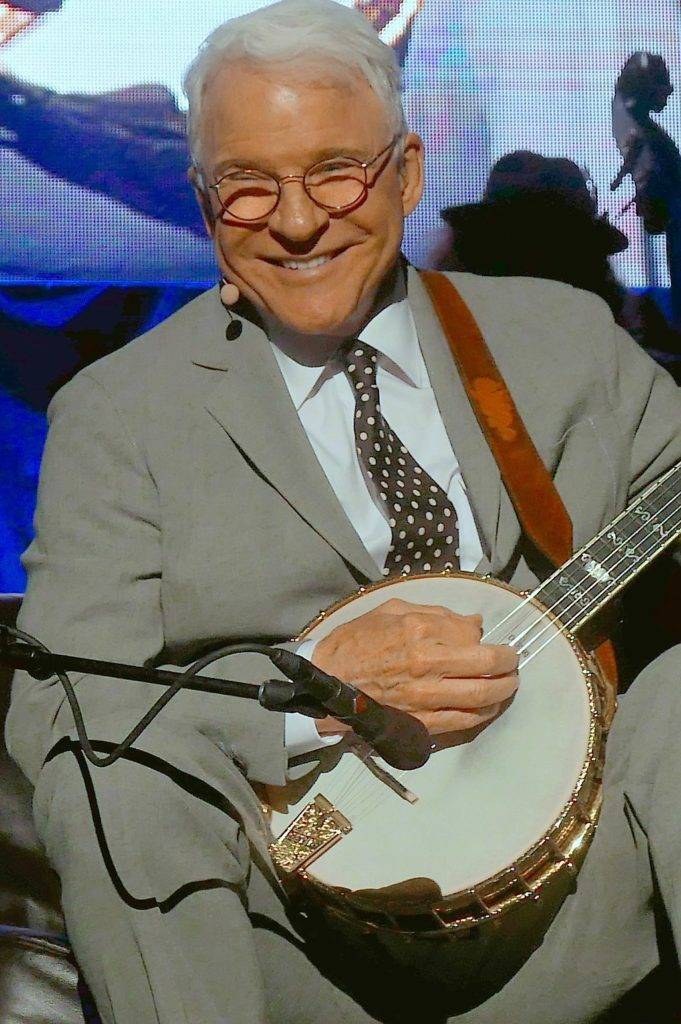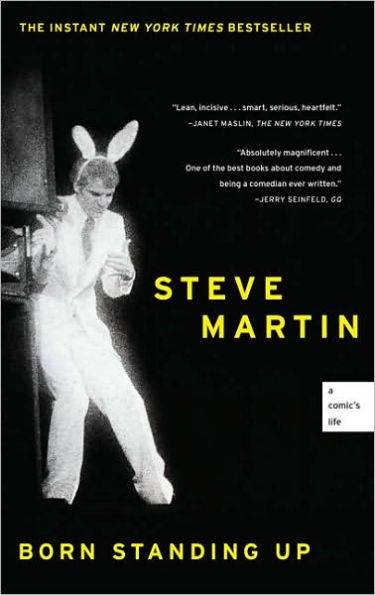I am a big fan of stand-up comedy. I have enormous respect for the men and women—whether professionals or amateurs—who get up on stage and do their best to make us laugh. And though I like many comedians, my all-time favourite is, and will always be, Steve Martin.
I discovered Steve Martin in the ’70s when I was a teenager. His album, A Wild and Crazy Guy, was a revelation for me. I would eventually get all of his comedy albums on vinyl—Let’s Get Small, Comedy is Not Pretty! and The Steve Martin Brothers—and spent hours listening to them. (I kick myself that I gave them away when we moved to Europe.)
Steve left stand-up comedy in the ’80s after 18 years. He has had a successful film career, published several books, written plays and even won a Grammy Award for his outstanding banjo performances the legendary Earl Scruggs. I could go on, but for those of you who are not familiar with Steve, you get the idea. He’s a talented guy.
I recently finished reading Steve Martin’s memoir, Born Standing Up. A terrific read. Jerry Seinfeld, another comedian whom I think is great, called it “one of the best books about comedy and being a comedian ever written”.
As I worked my way through the book, I found myself taking notes because of all the insights that Steve shares about his life in comedy. I have listed some of them below, in the order in which they appear in the book. They are valuable lessons, not only for aspiring comedians, but for anyone who has to speak in public.
Ten lessons from Steve Martin
Lesson 1: If you want to get good at speaking, you must work at it. Being a good speaker is rarely an overnight thing. It takes time.
“I did stand-up comedy for eighteen years. Ten of those years were spent learning, four years were spent refining, and four were spent in wild success.“
Lesson 2: The audience comes first. You must remain focused. I can relate to the quote below. When I gave this speech at the Toastmasters European Championships in 2009, the audience was laughing so much that I really had to focus on what was coming up (in the speech) and also on staying with time. My analysis of the speech, along with my thought process while I was delivering it, can be found here.
“Enjoyment while performing was rare—enjoyment would have been an indulgent loss of focus that comedy cannot afford.“
Lesson 3: Don’t forget about the transitions in your speech. They help to hold it together.
“I studied where the big laughs were, learned how [to get] the small ones, and saw tiny nuances that kept the thing alive between lines.“
Lesson 4: As you change through experience, and as technology changes, so too will there be opportunities for your presentations to change. Look for them, try them out, keep what works and discard what doesn’t.
“These albums broke ground and led me to a Darwinian discovery: Comedy could evolve.“
Lesson 5: Be aware of what is going on during your day. Carry a small notepad. Jot down ideas that come from things that you see. Start a story file (hard copy or electronic). You never know when these experiences will fit into a speech. If you don’t write them down, you will most likely forget them.
“I came up with several schemes for developing material. ‘I laugh in life,’ I thought, ‘so why not observe what it is that makes me laugh?’”
Lesson 6: You may think you have nothing to say. There is always something to say.
“I had a short-lived but troublesome worry. What if writing comedy was a dead end because one day everything would have been done and we writers would just run out of stuff? I assuaged myself with my own homegrown homily: Comedy is a distortion of what is happening, and there will always be something happening.“
Lesson 7: Self-confidence is very important. This is not to say that you should be smug or arrogant. Just the opposite. And humility and vulnerability are important too. But if you don’t look and sound like you believe in what you are saying, the chances are that I won’t believe in what you are saying.
“I gave myself a rule. Never let them know I was bombing: “This is funny, you just haven’t gotten it yet.” … It was essential that I never show doubt about what I was doing. I would move through my act without pausing for the laugh, as though everything were an aside. … Another rule was to make the audience believe that I thought I was fantastic, that my confidence could not be shattered. They had to believe that I didn’t care if they laughed at all, and that this act was going on with or without them.“
Lesson 8: Keep at it. Seek out speaking opportunities. You will get better. But don’t rest on your laurels. Hitting a home run with a speech is great, but it is more important to be good every time you step on stage.
“The consistent work enhanced my act. I learned a lesson: It was easy to be great. Every entertainer has a night when everything is clicking. These nights are accidental and statistical: Like lucky cards in poker, you can count on them occurring over time. What was hard was to be good, consistently good, night after night, no matter what the abominable circumstances.“
Lesson 9: A speech is composed of several elements: content; body language; voice; pausing; structure. They are all important.
“The new physicality brought an unexpected element into the act: precision. My routines wove the verbal with the physical and I found pleasure trying to bring them in line. Each spoken idea had to be physically expressed as well. … I tried to make voice and posture as crucial as jokes and gags. Silence, too, brought forth laughs. … Precision was moving the plot forward, was filling every moment with content, was keeping the audience engaged.“
Lesson 10: A great speech is one that the audience takes home.
“I believed it was important to be funny now, while the audience was watching, but it was also important to be funny later, when the audience was home and thinking about it. I didn’t worry if a bit got no response, as long as I believed it had enough strangeness to linger.“

Photo courtesy of David W. Baker

















13 Replies to “Ten Lessons from Steve Martin”
Hi John,
Enjoyed the artcle on Steve Martin. Brought back memories how he was your idol in your teenage years.
Love,
Mom
Thanks, Mom. He’s still going strong, only now his focus is his music.
John xo
Great post John.
Thanks, Dave. Happy New Year!
Good stuff John! I watched him recently when he hosted the Oscars – brilliant stuff!
Thanks, Julian. He is such a versatile guy that he excels in all kinds of situations.
Cheers!
John
John, I liked your post. What came across from point 6 (and point1) and which is always a problem to aspiring writers like myself, is the tendency to hold on to your “gems” or priceless discoveries as you fear that there will not be any others. But whether in comedy or cutting of diamonds, you can always improve. The more you push away your current “bright idea”, you will be making room for more and even brighter ideas. This is at first counter intuitive but it works. I am not familiar with a lot of Steve’s early work, but am very impressed by the Pink Panther films. This clip is fantastic. https://www.youtube.com/watch?v=PkgntZqYDHU
Thanks for the great comment, Conliffe. You touch on a very important point – the importance of being able to let go of what has worked well in order to discover even better things. Thanks for sharing the clip. Hilarious! If you want to hear some of Steve Martin’s albums, there is a good selection here on YouTube. It’s interesting to listen to those albums. His routine was so different from anything else around at the time, and that is what propelled him to his success.
oh man, lesson 6! wow. that’s helpful.
It’s true, Beth. There is always something happening. A few months into writing this blog, I thought that I would run out of things to write about. Almost nine years later, I am still going. Thanks for reading.